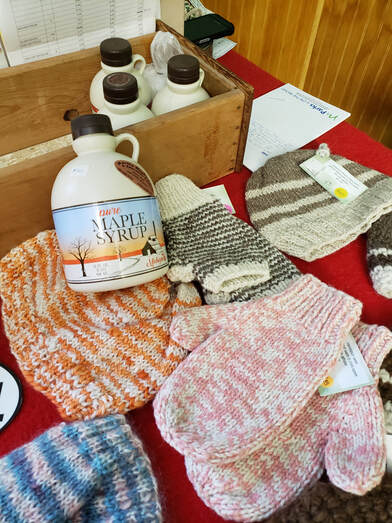 This past week at the Bellaire Winter Farmer & Artisan Market, we interviewed Doug Bedell of Raven’s Roost Farm (Bellaire). Doug raises Scottish Highland beef, registered Shetland sheep, and chickens. Products include grass-fed beef (raised with no grain, no antibiotics, no artificial growth hormones and no GMOs), raw fleeces, hand-made hats and mittens, and machine-knit wool socks. Doug was born and raised in Bellaire but not on a farm. “If you would have told me when I was in high school that I was going to live on a farm, I would have told you that you were crazy”. His family bought the formerly known Hem Street Orchard Family Farm in 1963. Later in life, he moved back onto that farm and more recently carved out a smaller, 22-acre piece where he raises cattle and sheep on pasture. The name of the farm comes with a story - in 2003, when Doug wanted to register his lambs, he needed a farm name. One day, while looking out the window, he noticed ravens over the pasture doing their regular aerobatics, and he enjoyed watching them play. The Ravens roost in the old apple trees and enjoy nesting in the pine plantation (which were from red pine seedlings he purchased from ACD many years ago). Thus, the name “Raven’s Roost Farm” was born. Doug brings frozen grass-fed beef, maple syrup produced on Wagbo Farm, and hand-made wool hats and mittens to the farmer’s market each Friday. The raw fleece from their farm is taken to Stonehedge Fiber Mill in East Jordan for processing and spinning from which Linda makes hats and mittens. Some of the wool is also taken to Zielinger Wool Company in Frankenmuth, MI where they have a knitting machine to make wool socks. When asked what his favorite thing is that he raises, Doug stated that everything has its advantages and disadvantages, so he doesn’t really have a favorite. “That’s like trying to choose a favorite beverage…. whatever is in my hand, that is my favorite at the moment.”
1 Comment
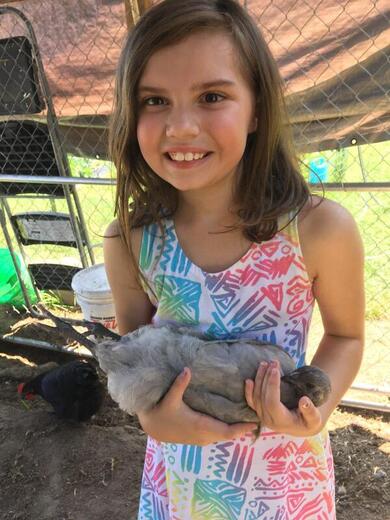 On November 20, ACD interviewed Tori Kowalski of Lel’s Lil Acre Farm in Bellaire, MI. On the first market date of the winter, Nov. 8, Lelianna, for whom the farm is named, was present with her mom at the market as Bellaire Schools were closed. Lelianna is a great spokesperson for the farm, and they have been raising chickens for eggs and meat for about three years. This past year, they started growing strawbale vegetables which Tori hopes to bring to market next summer. Tori explained that due to the very poor soil on her property, she purchased straw bales and “conditioned” them, which will decompose and provide the necessary nutrients needed by the plants. When asked what she likes best about being a farmer, Tori replied, “The freedom to work my own hours, and eat fresh, healthy food.” She also enjoys the therapeutic effect her chickens have on her. “They are so interesting, each with their own personalities. They are really fun to watch.” Tori also likes being able to provide a humanely raised, healthy, fresh alternative to factory farmed eggs. She states that although Michigan passed the cage-free law, that does not mean the chickens will be raised in a humane manner, nor that the eggs will be any healthier or fresher. Chickens raised on factory farms will are only given a tiny space in which to live and are confined with hundreds of other chickens (spreading diseases that require antibiotics). Tori is collaborating with other egg farmers in the area to establish an Egg Co-op which will raise funds to build an egg processing facility. By law, she can only sell her eggs directly to customers and cannot sell to restaurants, unless the eggs are washed, graded (for size), and certified through a certified egg processing facility. Tori stated that about half her income comes from her farming activities, and she hopes that in five or six years, 100% of her income can be generated from Lel’s Lil Acre Farm. The Bellaire Winter Farmers Market helps support the farm during the long winter months. 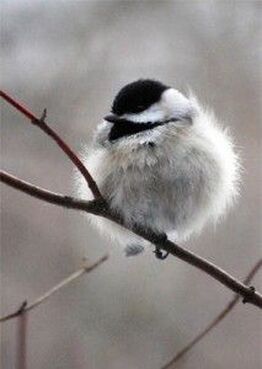 Winter is here in Antrim County, and while we can bundle up and brave the cold to partake in outdoor activities, animals do not have the luxury of snow pants and a warm coat. Many animals also do not have the luxury of access to food year-round like we do through our grocery stores. Winter is hard on most animals, and because of that, they have adaptations to survive. Some animals migrate, meaning that they move to an alternate location for the duration of winter. Animals migrate because of lack of access to food and/or cold weather conditions. Animals that migrate from Michigan to more mild locations include butterflies and birds such as robins and hummingbirds. Some birds even migrate to Michigan (from more northern locations) during the winter, including snow buntings and crossbills. Waterfowl migrate to find open water so they may not migrate if there is open water during the winter. Some animals migrate short distances and their migration might be east-west instead of south. This includes deer in the UP who move away from Lake Superior to avoid heavy snowfall. Other animals hibernate or go through torpor, which means that they sleep for part or most of the winter. In both, the animal’s body temperature, as well as breathing, heart, and metabolic rates slow. However, hibernation typically lasts for an extended period of time, while torpor is a short-term/temporary state. While animals like bears and some bats hibernate, animals like raccoons and skunks go through torpor when conditions are tough (really cold temperatures or lack of food) and they need to conserve energy. Aquatic frogs also hibernate under water on the bottom of a pond or lake but on top of mud. Cold-blooded animals like snakes and turtles also spend their winters in a dormant state as they do not have the warmth to move around. Snakes will hide in underground rodent burrows, and aquatic turtles will burrow under mud in a pond or lake. Finally, many animals will live in Michigan during the winter, but have other special adaptations that allow them to survive. Animals like beavers and red squirrels build up a cache of food during the fruitful times that they then utilize during the winter. Snowshoe hares and weasels grow a new, thicker coat of fur during the winter that changes to white to allow them to be better camouflaged in the snow. Many adult insects die off before winter but leave their offspring to survive winter. This includes fruit flies which spend the winter as pupa inside galls (those round balls you see on the stems of plants) and aquatic insects which live in the water under ice as nymphs. Birds that stay in Michigan, such as the chickadee, fluff their feathers to trap heat, among other adaptations. Winter in Michigan may be tough for humans with the lack of sunlight and cold and snowy weather, but it is even harder for animals as they do not have the luxuries we have. However, many animals have special adaptations that help them to survive. More information can be found on the MSU Extension website at https://extension.msu.edu. 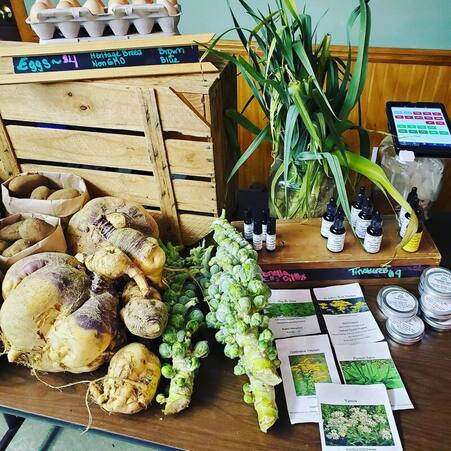 This week's Featured Farm is Danu Hof, and Caitlin & Larry McSweeney-Steffes answered a couple questions for us about their farm in Mancelona. Danu Hof also catered our Annual Meeting dinner last night and we thank them for a fabulous meal! How and when did your farm get started? We purchased our farm in October 2017 and by the end of that month had our first pigs on property and haven’t looked back since. We had a five year plan that we truly ended up fitting into 5 days once we found the property and fell in love. We are both Chefs by trade and always working with food became more and more aware of the importance of the ingredients and the food we eat and wanted to help bring back the small local family farm. What do you grow on your farm? What do you sell at the market? Farrow-to-finish Heritage breed pork, Heritage breed chicken eggs, a variety of produce including, Heirloom tomatoes, a variety of bush beans, carrots, zucchini, summer and winter squashes, Brussel sprouts, potatoes, cucumbers, leeks, asparagus, radishes, beets, sun chokes, spices, herbs and pumpkins. We always have a selection of pork and we will be restocked in the next week or two with everyone’s favorites, Farm Fresh Eggs, and through winter we will also have apples, dried spice mixes, salves, tinctures, honey, and assortment of jellies and salsa. What do you like about being a farmer? Why do you do it? The freedom and sense of accomplishment and a job well done after a hard day of work. Revitalizing our 100 year old farm and working closely with the land and our livestock. We also love getting to know our customers and being able to connect with them on a one on one bases and providing amazing quality products. We wanted food freedom for ourselves and the community, to cultivate our own food on our own land and experience true freedom. There needs to be a large change in our food industry and we want to be a part of the positive change for the healthier and the better. We wanted to get back to our roots and our heritage, both of us come from families where our grandparents were doing exactly this. What is your favorite thing that you grow and why? For Caitlin it’s the pigs, the piglets are always so cute and fun to watch run around and play and you get to know everyone and their personalities as they grow up getting to be pigs throughout the fields and barn. For Larry it’s the produce, specifically potatoes and Brussel sprouts. They both take time and care to grow. Brussel sprouts are great for our northern climate and it is fun to have them at market on the stalk and see people’s reaction to how they grow. Potatoes are very versatile for cooking and are hardy growers, there is a large variety and long shelf life if taken care of properly. Anything else? We also have a Farm Market Store on property open just north of Mancelona on the corner of 131 and Doerr Rd. 3775 Doerr Rd so if you miss us at market you don’t have to wait a whole week to catch us we have weekly store hours as well. |

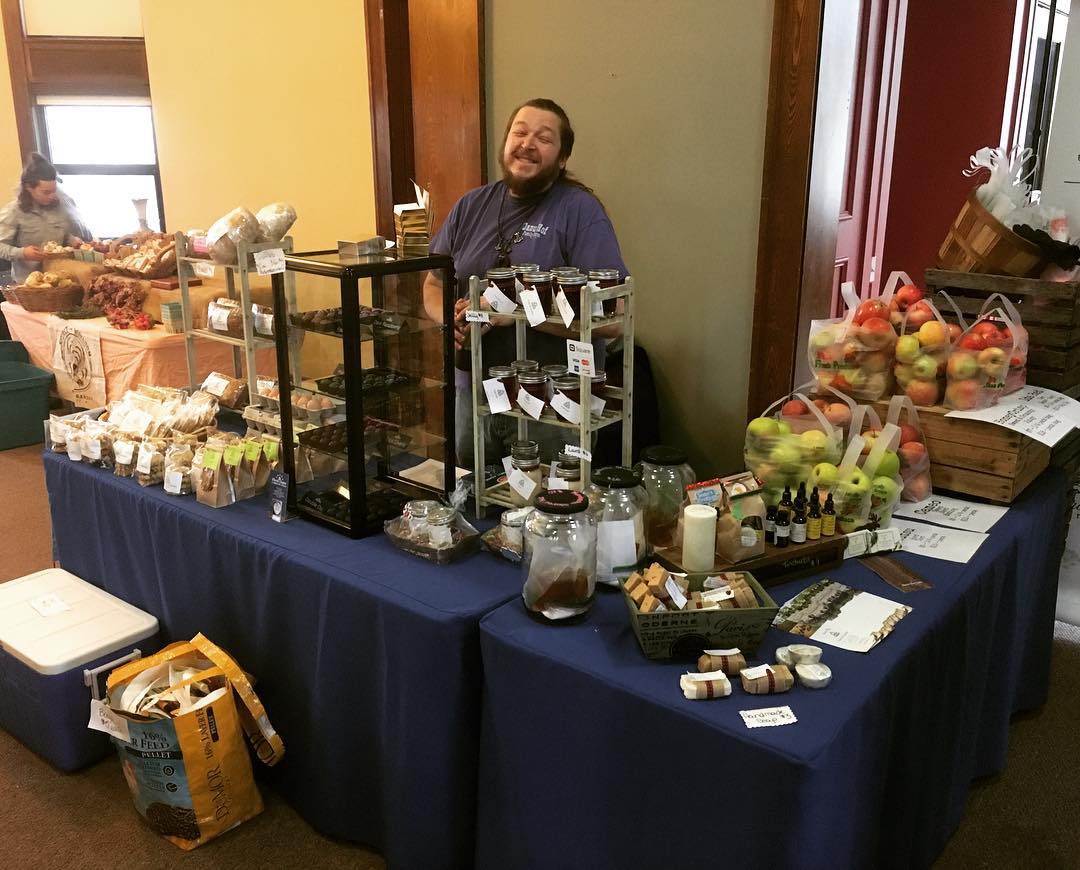

 RSS Feed
RSS Feed